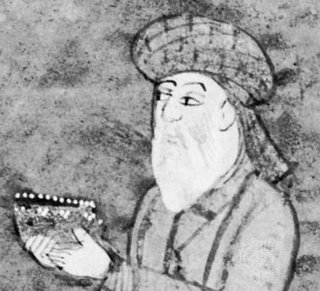
Hafiz of Shiraz is best known for his lyrics, and continued the tradition of mystical poetry in which Rumi and Sa'di took part (
Wikipedia biography).
The collection of poetry included in the Anderson anthology is of love poems, formal lyrics called
ghazals, similar to a sonnet in brevity and strictness of form. The following is an introduction to his
divan, his collection of mystic love poems. The translation if from
Fifty Poems of Hafiz, edited by A.J. Arberry.
"Ho, saki, haste, the beaker bring,
Fill up, and pass it round the ring;
Love seemed at first an easy thing--
But ah! the hard awakening.
So sweet perfume the morning air
Did lately from her tresses bear,
Her twisted, musk-diffusing hair--
What heart's calamity was there!
Within life's caravanserai
What brief security have I,
When momently the bell doth cry,
"Bind on your loads; the hour is nigh!"
Let wine upon the prayer mat flow,
An if the taverner bids so;
Whose wont is on this road to go
Its ways and manners well doth know.
Mark now the mad career of me,
From wilfulness to infamy;
Yet how conceal that mystery
Whereof men make festivity?
A mountain sea, moon clouded o'er,
And nigh the whirlpool's awful roar--
How can they know our labour sore
Who pass light-burthened on the shore?
Hafiz, if thou wouldst win her grace,
Be never absent from thy place;
When thou dost see the well-loved face,
Be lost at last to time and space."
The first stanza serves as an invitation to the reader and an introduction to the surface theme--unrequited love. The second stanza furthers this theme, with the evocative phrase "musk-diffusing hair," but many translations consider the subject of this couplet male--particulary the divine, beloved one. This stanza then becomes the junction for another theme: being torn between desire for spiritual completion and desire for worldly pleasures and goods.
The third stanza points out that there is little use in clinging dearly to the world, for life passes quickly. The next stanza becomes a bit muddled in the Arberry translation. Most other translators use "elder" or even "priest" in the place of "taverner" (in the word by word translation this character is an elder of the tavern who bears authority). In other words, he is the one who knows the way on this road--the road through life that Hafiz refers to with the caravanserai in the previous stanza. Thus, Hafiz is saying that acts considered blasphemy (the wine on a prayer-mat) may sometimes be necessary, and that we can be guided by those who truly understand life and mankind.
By such acts of sacrilege, Hafiz points out in the fifth stanza, he has moved from "wilfulness" to "infamy." Most translator's interpret the rest of the stanza as Hafiz questioning how he can conceal his shame--his infamy--when other men take such joy in speaking of it. However, within the spiritual context of the poem, Hafiz might be considering that the mystery of life remains concealed--perhaps he is not asking a question at all, for the word by word translation reads "concealed who remain that secret about which him/her they arrange gatherings." I'm arguing that the Arberry line
should read "Yet how concealed this mystery/Whereof men make festivity!" This concealed secret (about the beloved) is what Hafiz is trying to uncover--these lines seem to be exclamatory, or even plaintive, rather than inquisitive. The sixth stanza is concerned with the blindness of those who don't plunge into the questioning of life and soul that Hafiz has taken on and lost his reputation to.
The last stanza, however, makes it clear that because Hafiz is willing to face the "whirlpool's awful roar" he will see the Beloved's face. Again, many translations use a male pronoun, and I feel that Hafiz means both genders here. He intends to describe an earthly bond with the woman he desires as well as a holy bond with the beloved one. I believe the ambiguity of the Persian language is part of what makes Persian mystic poetry so powerful, for it's easier to write two ideas at once when the words themselves mean two ideas. The final lines are a promise of sorts: Hafiz will see the Beloved (and his beloved) if his true to his path, and once he sees the beloved, the world will fall away--he will no longer be troubled by spiritual and material conflict. I think Hafiz is saying that the God-realization is heaven itself, for the earth falls away as the soul begins to understand God.
The beginning of the last stanza employs a
takhallus--a device by which the poet names himself in his work, usually at the end of a poem. This self-naming brings the reader back to the material sense of the poem, for it is easy to be drawn to the questions of the spiritual levels and forget the literal situation, which alone can offer resolution. Though Arberry's translation takes many liberties (mostly to preserve form), it exemplifies Hafiz' ability to write on many levels at once.







